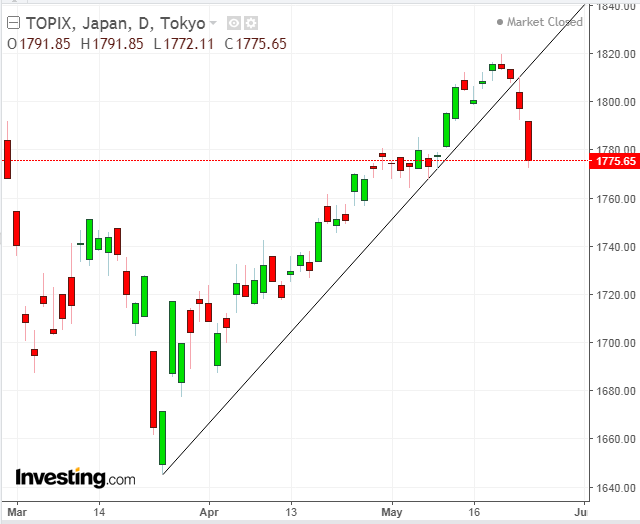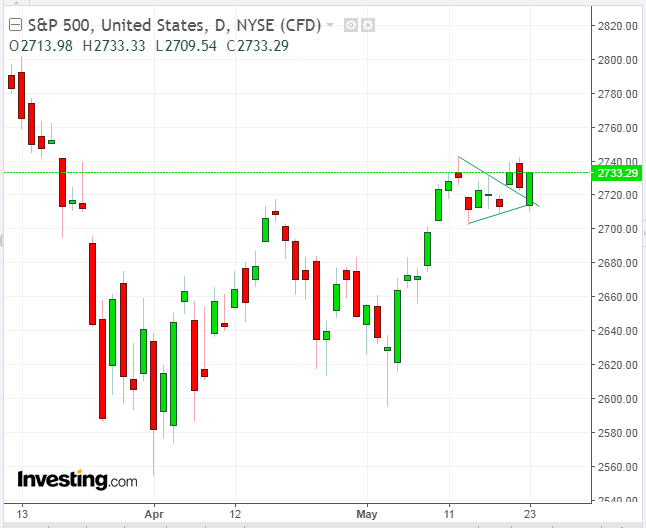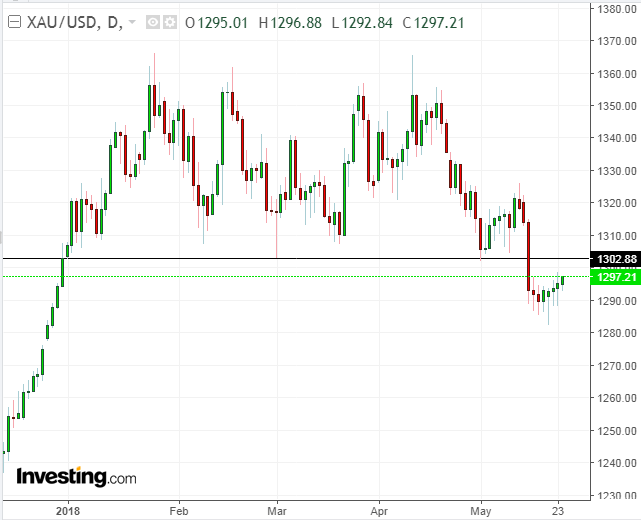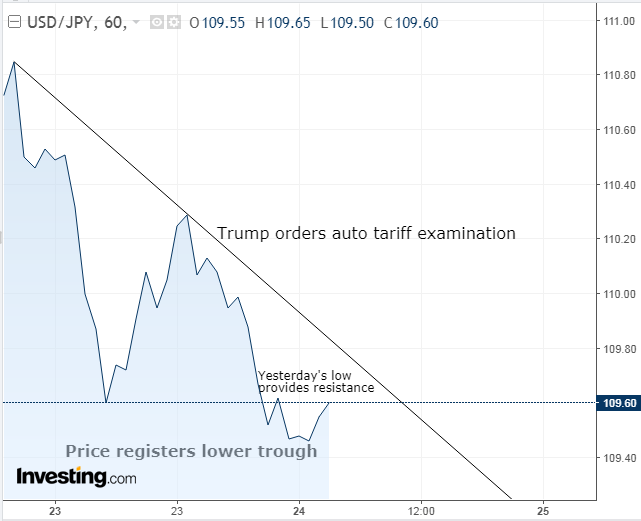-
New threat of US tariffs on auto imports spurs global auto shares selloff
-
European miners and oil stocks outperform, even against continuing oil prices decline
-
US stocks boosted by dovish Fed minutes; futures mixed amid renewed geopolitical risk
- Dollar takes a hit, boosting gold and yen upward move
Key Events
Global stock indices were seen struggling to gain traction on Thursday, amid renewed global headwinds that included fresh plans by US President Donald Trump to impose hefty tariffs on automakers imports.
US futures for the S&P 500, NASDAQ 100, Dow were mixed, hovering around neutral levels in the early European session.
Automakers took a hit in Europe after Trump dealt global markets a new trade blow by ordering the US Commerce Department to examine the possibility of imposing tariffs of up to 25 percent on vehicle and car-parts imports.
German automakers BMW (DE:BMWG), Daimler (DE:DAIGn) and Volkswagen (DE:VOWG) each plunged around 2 percent on the news.
However, miners and oil stocks offset slumps in automakers shares, even as WTI and Brent futures kept edging lower, the former on track for a third consecutive negative session today. This helped the STOXX 600 eke out a 0.1 percent gain. However, the pan-European index is still more than one percent below the three and a half month peak it posted on Tuesday, as it suffers downward pressure from both Italy's political headwinds (and in particular, from the country's new government coalition spending plans) and ongoing global trade jitters.
Stocks in Asia also slipped lower, led by downbeat Japanese stocks, which took the brunt of Trump's latest trade tariff move.
The TOPIX tumbled 1.2 percent after Trump's announcement pushed automakers shares lower, bringing the Japanese benchmark index's four-day declines to a total of 2.15 percent. Re-ignited trade headwinds prompted a further spike in the yen—creating an additional hurdle for Japanese stocks. Technically, the TOPIX extended a decline after crossing below an uptrend line since March 26 on Wednesday—thereby signaling a reversal.
Chinese shares on the Shanghai Composite slid 0.4 percent, to a two-day 1.9 percent decline, following an impactful hanging man formation on Tuesday. Shares on Hong Kong's Hang Seng instead managed to climb 0.4 percent.
South Korea's KOSPI slid 0.25 percent on Thursday, as investors finally caught up with heightened geopolitical risk after they had managed to focus squarely on corporate performance on Wednesday, when they shrugged off mounting indications that the June 12 meeting between the US with North Korea may not take place.
Global Financial Affairs
The never-ending twists seen across global stock markets this year are somewhat rebalancing the upbeat ride equity investors and traders enjoyed last year, when they simply had to remain invested and watch prices surge, supported by historically low levels of volatility.
Yesterday, US stocks bounced back from a loss in the last two hours of the session, after minutes from the Fed's May monetary policy meeting revealed policymakers are not seeking to speed up the pace of tightening.
Yields on 10-year Treasurys closed below the 3 percent psychological level, but are bouncing back above that key mark today after sliding lower in the early session thereby forming an intraday hammer.
The S&P 500 ticked 0.32 percent higher on Wednesday. However, it was defensive sector Utilities that led the gains (+0.91 percent), underscoring the lingering risk-off sentiment. Shares of Financials were hit the hardest because of the reduced outlook for interest rate hikes, losing 0.64 percent. Materials and Industrials, down 0.23 percent and 0.12 percent respectively, took a beating from reignited trade headwinds.
Tired of the geopolitical roller-coaster sparked by ongoing trade disputes and diplomatic glitches over North Korea and Iran, global investors took shelter in gold, bonds and, naturally, the safety of the yen.
Gold is gaining ground for a third day, within a return move to retest the integrity of the double top pattern. It's worth noting that the yellow metal inched higher yesterday despite a strengthening dollar. The dollar, in turn, managed to close higher even after FOMC minutes revealed a dovish slant.
Meanwhile, the yen benefited from the global flight to safety, the dollar's intraday weakness and a rotation out of Turkish exposures by Japanese investors.
Up Ahead
- Thursday, the Bank of England Markets Forum takes place at Bloomberg London. Speakers include BOE Governor Mark Carney and New York Fed President William Dudley.
- A St. Petersburg Forum panel this coming Friday includes Russian President Vladimir Putin, France's PM Emmanuel Macron, IMF Managing Director Christine Lagarde, and Japan's PM Shinzo Abe.
- Also on Friday, European Union finance ministers discuss the latest Brexit developments in Brussels.
Market Moves
Stocks
-
The STOXX Europe 600 gained 0.1 percent.
-
Futures on the S&P 500 Index dipped less than 0.05 percent.
-
The UK’s FTSE 100 advanced 0.1 percent.
-
Germany’s DAX dropped 0.1 percent to the lowest level in more than two weeks.
-
The MSCI Emerging Market Index climbed 0.3 percent.
-
The MSCI Asia Pacific Index slid 0.2 percent to the lowest level in more than two weeks.
Currencies
-
The Dollar Index fell 0.15 percent and is trading at the bottom of the day.
-
The euro increased 0.2 percent to $1.1719, the biggest climb in almost two weeks.
-
The British pound advanced 0.1 percent to $1.3359, the largest gain in a week.
-
The Japanese yen climbed 0.5 percent to 109.57 per dollar, the strongest level in almost two weeks.
-
The Turkish lira decreased 2.4 percent to 4.691 per dollar, the weakest level on record with the largest tumble in more than seven months.
Bonds
-
The yield on 10-year Treasuries gained one basis point to 3.00 percent, the biggest gain in a week.
-
Germany’s 10-year yield advanced one basis point to 0.51 percent.
-
Britain’s 10-year yield increased less than one basis point to 1.44 percent.
-
Italy’s 10-year yield decreased three basis points to 2.367 percent.
Commodities
-
West Texas Intermediate crude declined 0.4 percent to $71.57 a barrel.
-
Gold climbed 0.2 percent to $1,296.57 an ounce, the highest in more than a week on the largest increase in two weeks.
-
Brent crude fell 0.4 percent to $79.46 a barrel.




